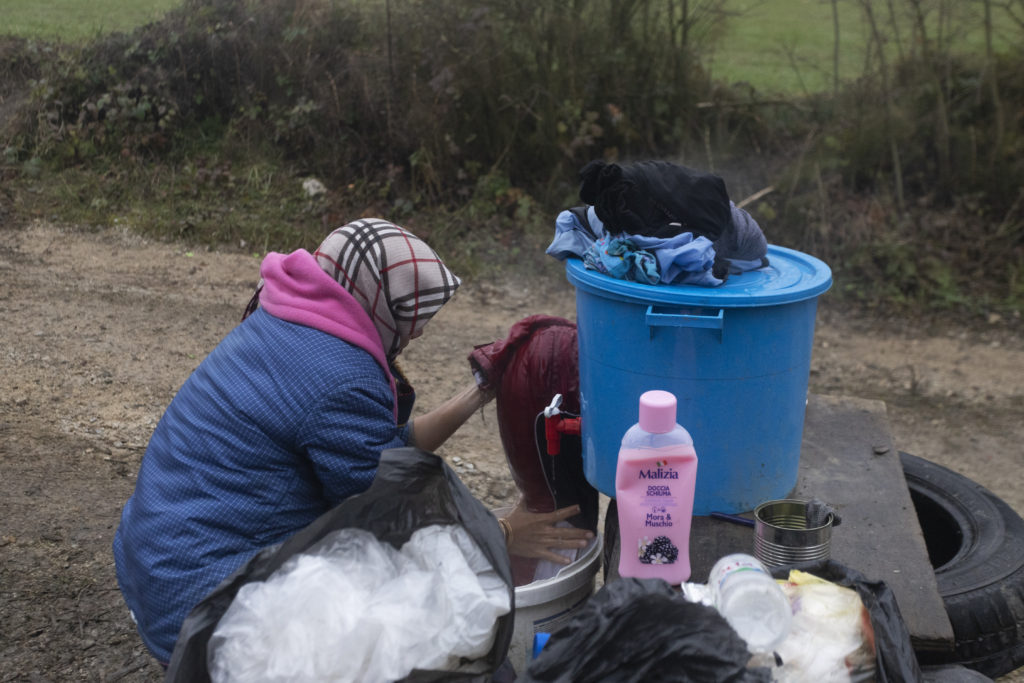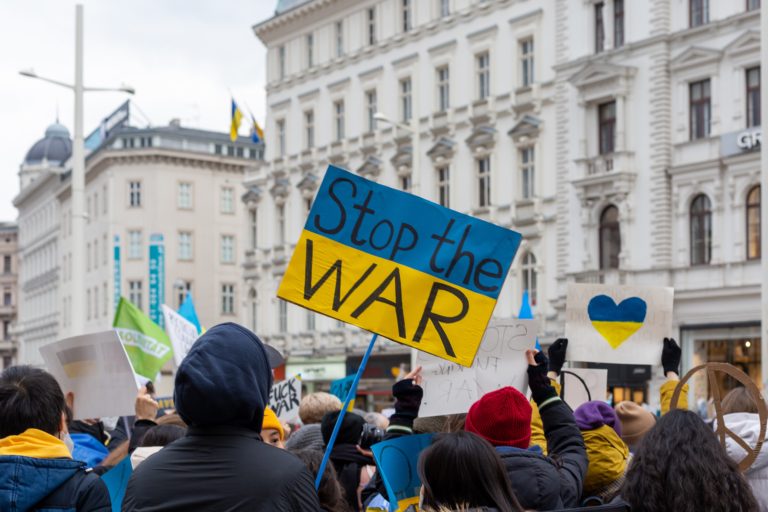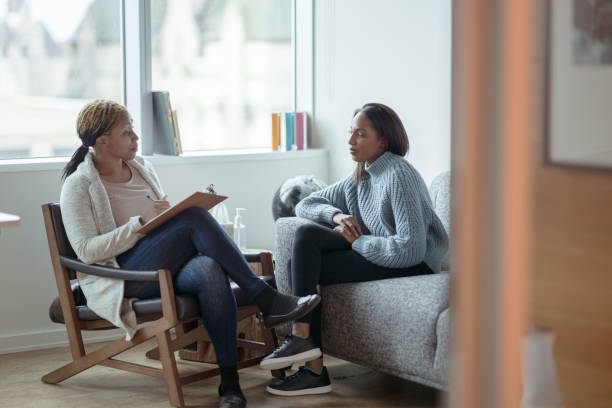Migrant Women Press spoke with individuals and organizations working with migrant women in Italy to learn how Covid-19 is affecting their lives and activities. Most importantly, how they are doing to overcome these difficulties.
by Juliana da Penha
Since the World Health Organization declaration of Covid-19 pandemic, and advice that “all countries must strike a fine balance between protecting health, minimizing economic and social disruption, and respecting human rights” states started to take measures to manage the spread of Coronavirus.
It was observed, especially through the media coverage, that despite all the globe is affected with this pandemic, the virus hits vulnerable communities harder, especially women. Human rights and women organizations, activists and journalists around the world raise awareness about the impact of the pandemic on women and how domestic violence increased during the quarantine, as women and girls might be locked with their abusers. The situation of migrant women is even worse as many of them are undocumented and have fundamental rights such as access to healthcare denied.
Many local organizations give assistance for migrant women, helping them to access local services, learn local languages, access psychological support to overcome traumas, find opportunities to learn new skills, get into employment, organize and empower themselves. Moreover, they create a safe space where women can meet and overcome loneliness. Many of them run their projects with minimum government provision.
After Covid-19 outbreak, these organizations had to close their premises as most of their work is done through social interaction and started to do some of their activities in-home office. Some of them manage to keep a few services using the Internet. In this opportunity, we spoke with individuals and organizations supporting migrant women in Italy to understand what difficulties they are facing and also how they are building resilience during this uncertain time.
Migrant women organizations in Italy: amid struggles and strengths
Casa di Ramia is a women intercultural centre in Verona, well known as a safe space where women from different origins meet to create, learn and develop a variety of projects. It’s also a place where many local women organizations use as a base for their activities. Mainly, it’s a place where women can listen to and support each other. “This is a place of Verona municipality, under the social services area and Equal Opportunities office; however, is managed like an informal space, there is no need for any documentation to get access. It’s a meeting place created mainly to fulfil the need of the women to meet each other, to do things together, think together, confront each other and construct a common language,” explained Elena Migliavacca, Coordinator of Casa di Ramia.
Before the lockdown, this space who open its premises on 2005, offered a daily program of activities for women, youth and children with Italian and English lessons, narrative groups, arts and crafts, traditional dance classes, choir, after school support, sewing classes and more. Many women that attended activities in that place later created their groups and now use the space to organize their events and create collaborative projects. Some women just come to meet other women and feel at home.
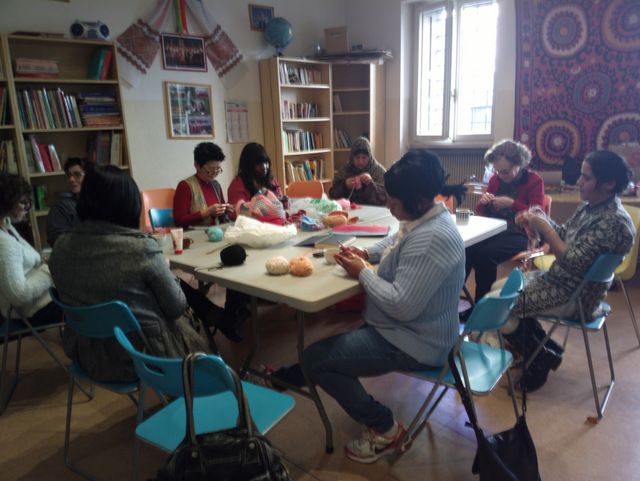

During the quarantine, some groups managed to continue a few of their activities at a distance using the Internet. But the impact of the closure of this space is enormous. Many women are now isolated, facing financial hardship and in danger of being victims of domestic violence. For migrant women organizations, the quarantine represents the uncertainty of funding, lack of sustainability of the projects and a few possibilities to give support to women in need “The impact of this closure is terrible because these meeting spaces are essential for mutual support. This isolation situation is tough. We try to resist, but we can’t do a lot.” explained Elena.
Aware of the vulnerable situation of many of the women who attended the activities at Casa di Ramia, Elena is contacting charity organizations, like Caritas, to provide food packs for women that are in financial difficulties. She also mentioned that although it is in a small dimension, some of the women groups of Casa di Ramia are resisting and creating ways to keep supporting each other and continue some of their activities online.

“The impact of this closure is terrible because these meeting spaces are essential for mutual support. This isolation situation is tough. We try to resist, but we can’t do a lot.”
Arpilleras: Latin America women resistance inspiring women in Italy during the quarantine
During the 1970s and 1980s under the totalitarian military regime of Augusto Pinochet in Chile, women were making Arpilleras – vibrantly coloured embroidery and patchwork pictures – and used that creations as a way to share their pain and worries about their husbands, fathers, family members and friends who were killed, tortured and disappeared.
Arpilleras embroidery served to document and denounce the oppressions during a regime that not allowed freedom of expression. It helped to register women capacity to be resilient overcoming suffering, loss and desperation. Following it becomes a movement, inspiring women groups in Latin America and later inspired women in other places. Arpilleras is used today also as a tool to denounce gender-based violence and other forms of oppression.
Motivated by women from her home country, Peru, Vitka Olivera de la Cruz started an Arpilleras workshop. She is a lawyer with a specialization in social studies. Vitka works at public office service in Verona giving advice, juridical and administrative support to migrants. She is also one of the women who develop projects at Casa di Ramia. She started the Arpilleras group, and through embroidery, women are creating narratives. “We use our bright colours, with all the stories that we can work on, doing portraits or other things. For example, in Casa di Ramia, we represented the house like a tree, and while we are working on this story, women start to remember their own stories and expressing themselves, step by step. They also start to recognize themselves, for example, to represent your skin colour, you need to find the proper fabric with that colour. So, we construct this with some texts, some Latin America music and poetry.” she explained.
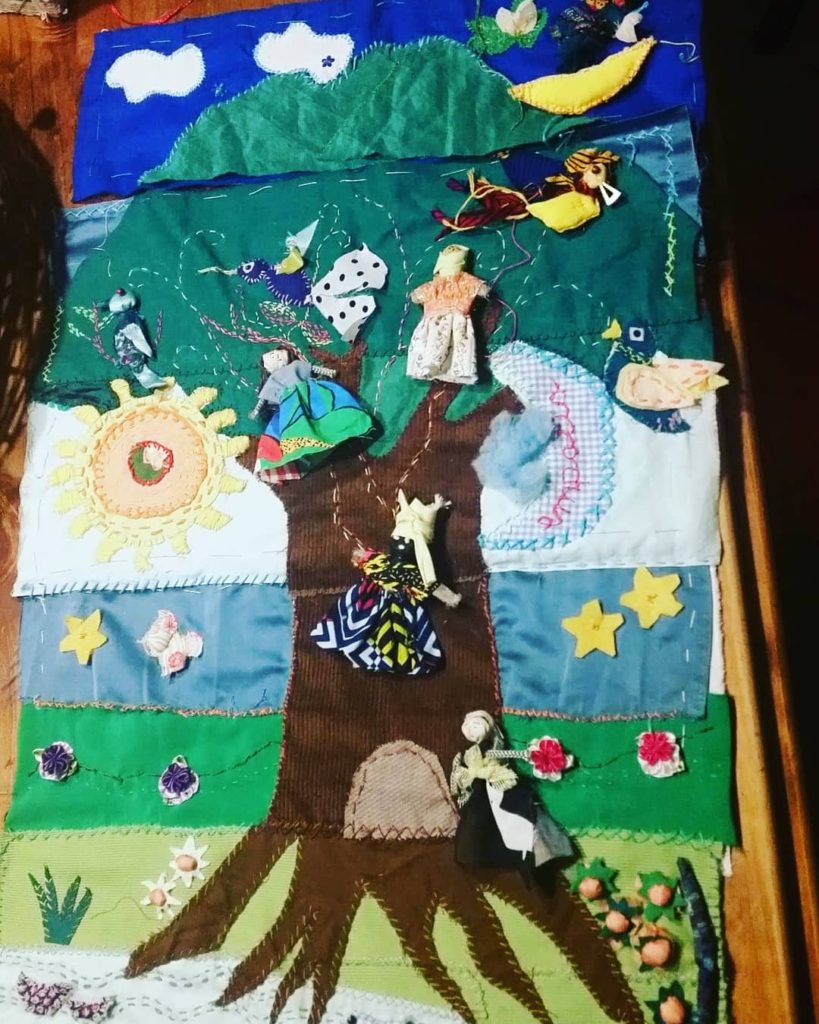
When the quarantine started in Italy, Vitka thought that it would be a shame to stop this activity, as things were going well, so she keeps doing the workshop using WhatsApp. The inspiration to keep the Arpilleras workshop online came when she saw her daughter, who is at the secondary school attending her school lessons online. “I remember that I come from South America and there we invent everything. So, I said to the group: If you are happy, we can keep the lessons via WhatsApp. After that, we started to share videos, photos, and we even danced. I put some music and the 5 of the women that were online that day danced.”
Following the dynamics of the workshop before the lockdown, the group meet at WhatsApp every Friday, from 10:00-12.00 and Vitka also gives some homework to the group. “For example, we worked with fear, and everybody starts to say what are their fears. Some of them said they are fearful of some animal; others said they fear of the emptiness. They should draw these fears and also drawn how to overcome these fears. And on the day of our meeting, they present all the drawings, sending the pictures”.
Vitka sends videos teaching the group how to embroider, and they send a video back showing their work. This Arpilleras group is mixed, with Italians and migrant women supporting each other in this difficult time. “They feel capable, and their skills are increasing. We started to discuss any question related to the issues we face, things that we thought we were not capable and that now we are doing. We try to discover why we thought we were not capable. Who told us we were not capable? We work on the self- esteem.”
The Arpilleras group are planning to present their work at a conference about community and self- healing in October at Verona University. They also aim to create small outfits with a local social enterprise that works with innovative projects. “The idea of Arpilleras in Chile and Peru finished well because they started to sell their products, they went to museums. I will love if we manage to do it. We just started, but this is the aspiration. We created some dolls, each one from our country of origin. We will keep doing these dolls. I come up with the idea to do even more dolls and create an exhibition, to speak about our work in Casa di Ramia, as a meeting point for women.”
“I remember that I come from South America and there we invent everything.”
Speaking about the primary motivation to continue the Arpilleras workshop Vitka said “First of all, this project serves as a distraction for the thought that we will not manage to end this bad period. I make jokes and say about things that happened in Peru. Our way to exorcise things in Peru is making jokes about the situation. One of the women sews the Coronavirus (laugh). With some stories I told them, they realized that many other pains are happening.” And she concludes “I was inspired by what happened in my country. We have many issues, but we keep going”.
“I was inspired by what happened in my country. We have many issues, but we keep going”.
Challenges to support migrant women during the pandemic
In Italy, the estimation is that there are 600.000 undocumented migrants. This situation increases their vulnerability to human rights violations, difficulties to access fundamental rights such as health care, work exploitation and financial hardship. There is a campaign in Italy now, Sanatoria Subito, pressing the Italian government to give amnesty for undocumented migrants as they are the most vulnerable to the virus and the impact it creates.
A significant number of migrant women in Italy are informal workers, and the unemployment in this group is high. After the pandemic, the situation got worse. Associazione Stella is an organization based at Casa di Ramia offering employability support for migrant women, helping to build CVs, job search and training opportunities. They also organize employability training assisting migrant women to understand how the job market in Italy works, informing and preparing them to face it better. Before the pandemic, their services started to be affected due to lack of funding and might not continue after the lockdown.
Vedrana Skocic, coordinator of Associazione Stella explained that funders were asking for requirements that were almost impossible for them to attend as they rely on small grants. It will be a significant loss as the women beneficiaries of the project were really in need.
Vedrana explained that most of the women are informal workers earning low income, and many are unemployed, desperate for a job. For Associazione Stella the lockdown represented the complete closure of their activities as women who attended lack of things such as data for their phones so, it’s impossible to plan any online action. “In the last employability training we organized, I realized that some women didn’t have the data to access in their phone some information I was giving to them. So now, they are incommunicable. Our target is women with a lot of financial difficulties, so Internet data is their last thought/urgency. So, there is no sense to organize something online for our women. We created a WhatsApp group, and I wrote to this group, but only a few women replied” explained Vedrana.
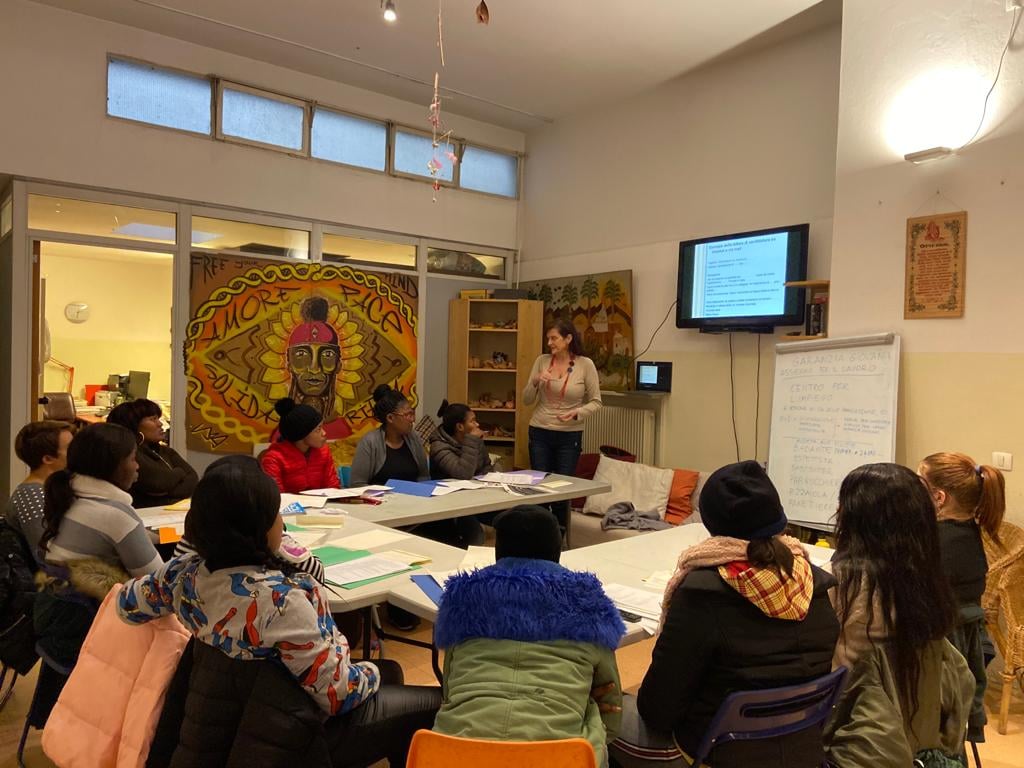
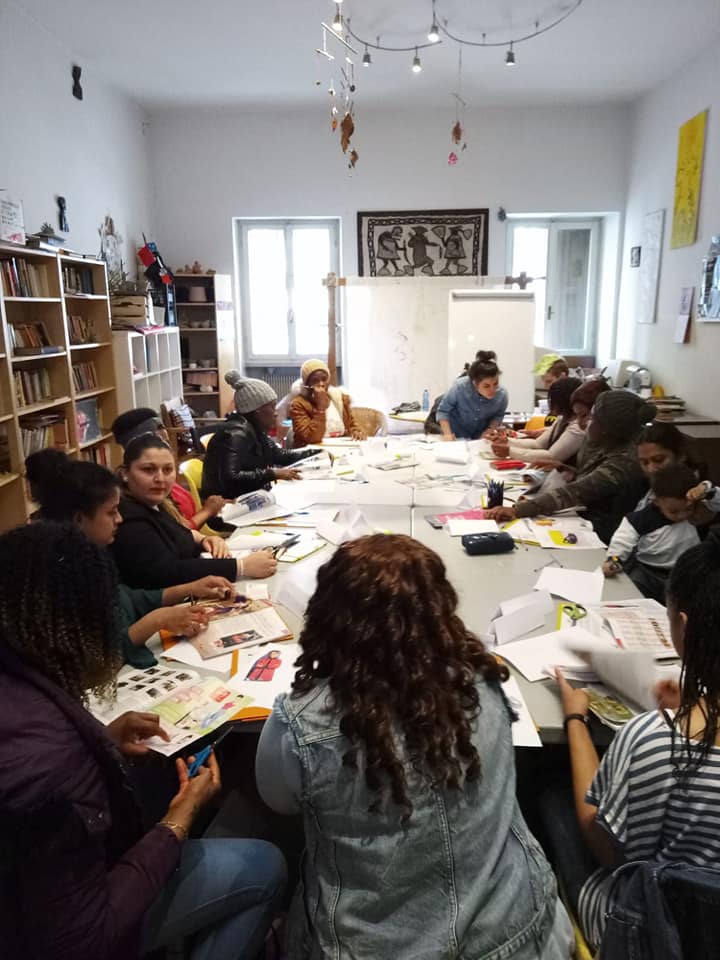
Even for the women who have Internet access, now their children also need to use it as they are at home, attending their school lessons online; hence they have the priority using the Internet. Vedrana underlines the fact that, during the project’s activities, women should speak about their job experiences and attending employability training is hard work so many women find it challenging. Now with their children, doing it online is problematic as they need time and space to concentrate on speaking about their experiences. Before the pandemic migrant women were desperate for a job and found a lot of difficulties. Now their situation is tough “They feel isolated at home. Many are single mothers with their children, without income and the small informal jobs, they used to do. They don’t know what to do. The media bombard with information, but they are still confused because many of them don’t speak Italian”.
They feel isolated at home. Many are single mothers with their children, without income and the small informal jobs, they used to do. They don’t know what to do. The media bombard with information, but they are still confused because many of them don’t speak Italian”.
Vedrana believes that one of the possible relief for the vulnerable situation of migrant women at this moment might be the vouchers the Italian government want to implement. Still, she is not sure how it will work. She also thinks that it is crucial to start now to reflect and discuss how the things will be organized after the quarantine “We can’t wake up a day and have to solve all these issues. We need to start to think about the solutions now”.
She suggests something women can do if they have access to the Internet while they are in quarantine, is to use the WhomeN website to assess their transversal skills. WhomeN is an EU project aiming to recognize the transversal skills of women at risk of social exclusion.
“We can’t wake up a day and have to solve all these issues. We need to start to think about the solutions now”.
A network of solidarity helping migrant women in financial hardship during the pandemic
Some migrant women organizations are using their network to find support for the most vulnerable and collaborating with other organizations to send food packs for the women in need.
Le Fate Onlus develop projects with women and children, mainly migrant communities in Verona. They provide services such as Italian language classes and help women to access local services for themselves and their children. They also deliver art crafts courses and projects to increase employment opportunities within the craft sector for migrant women. They offer psychological support for women during pregnancy, for victims of domestic violence and help women in financial hardship.
Cristina Cominacini, the coordinator of Le Fate, explained that the quarantine created a significant impact on their services as most of their activities rely on physical contact. They close their offices, and the staff are working from home. “Besides not knowing when, how much and how we will get paid for the work we are doing, it’s complicated to organize online activities because not all the women have a PC or a good internet connection. It’s not the same thing, for the relationship and for the things you can do.”
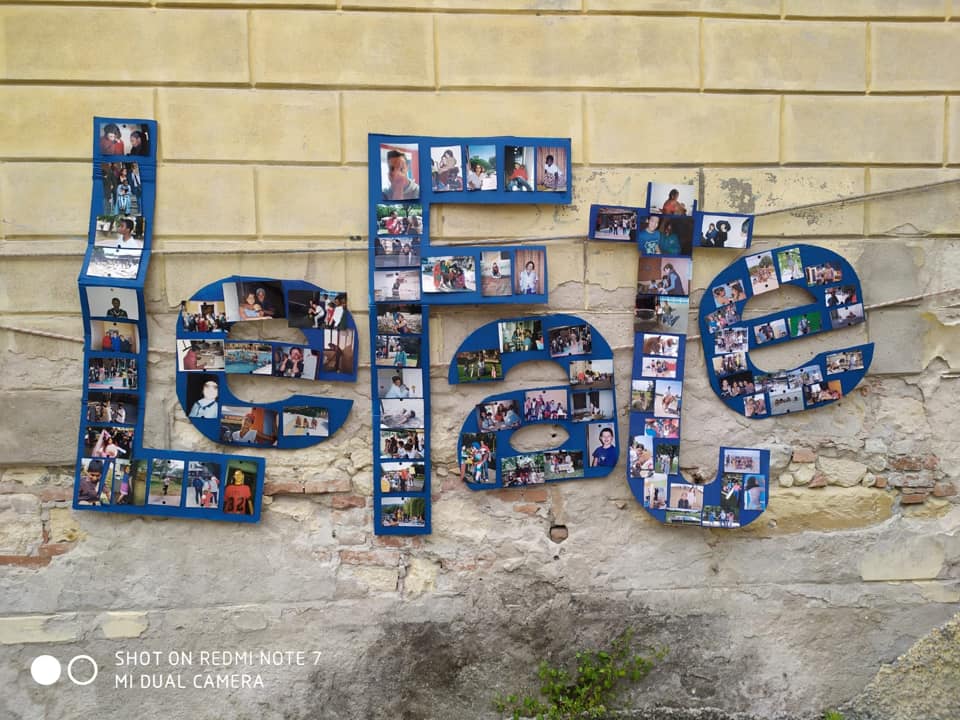
Le Fate is supporting women who attended their activities being in contact as much as they can, writing and calling them to understand their needs. Moreover, there are some educators from the organization, helping children to commit to their home studies as the Italian schools are delivering online lessons. Cristina explained that they are helping the women to understand how it works so that they can support better their children. Le Fate is also providing assistance for women who are facing financial hardship. “We can refuel at the Food Bank every month, so we distribute the groceries to those in need. This month we also received a fund of 1500 euros from the Mag (a mutual society) with which we were born, and we collaborate a lot. They thought that many of the people we follow have lost their jobs or they don’t have protection because they’re working illegally. So, we could make a small economic contribution for both women and families”, explained Cristina.
“Besides not knowing when, how much and how we will get paid for the work we are doing, it’s complicated to organize online activities because not all the women have a PC or a good internet connection.”
“They are feeling lonely”. Supporting victims of sexual exploitation in Italy during the pandemic
A 2017 report about human trafficking through the central Mediterranean route from the International Organization of Migration (IOM) estimates that 51% of the victims of human trafficking in the world are women. Women exploitation is primarily sexual (72% of the cases). The report revealed an increase of arrivals of migrants and those seeking international protection coming in Italy from 2016. IOM estimates that about 80 per cent of Nigerian women and girls arriving in Italy by sea in 2016 are likely to be victims of trafficking for sexual exploitation in Italy or other countries of the European Union. IOM also called attention to the fact of the significant and worrying increase in adolescent victims of trafficking.
Associazione Iroko Onlus is an organization helping victims of trafficking and sexual exploitation in Turin. They provide cultural and linguistic mediation, legal and administrative advice, support in housing and job search, access to education and health services. They also develop different projects to train and prepare women for integration into the labour market. Iroko also promotes networking activities, attending various conferences and meetings. The lockdown created a significant impact in their work, and now it’s difficult for them to keep in touch with all women they give support.
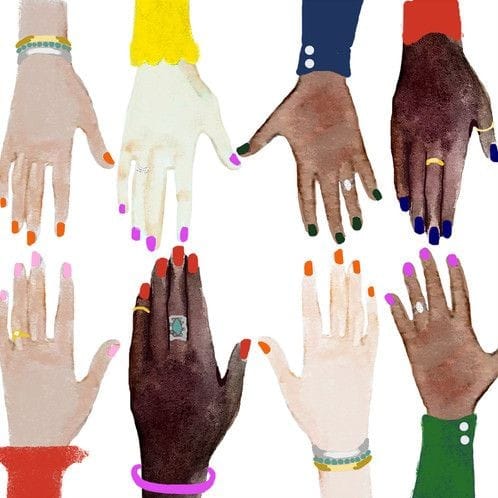
Ruby Till, responsible from communication at Iroko told us that many women they know lost their jobs and now are struggling to pay their bills. She explained that many of them didn’t have a job before. Now it is much harder to find because most of the services and industries are close. Visits to hospitals are at a standstill except in cases of urgency and risk to life. Ruby explained that although they are aware of many of the issue’s women are facing during the pandemic, the organization support at this moment is limited. “We have received complaints of domestic violence, but in addition to addressing them to the police, there is not much we can do. We have also received complaints from other organisations asking us for assistance for the women who they follow. They are also in difficulty. It is much more difficult to network. There are stories of increased domestic violence, but we are no longer able to follow the cases as before”.
“We have received complaints of domestic violence, but in addition to addressing them to the police, there is not much we can do.”
During the quarantine, Iroko has available a volunteer offering educational support for migrant women who struggle to follow their children with all their homework and on-line lessons. Ruby explained that they are giving this support because many children do not speak Italian as a mother language, and some mothers did not attend high school, so they find difficulties to support their children. For women who are facing financial hardship, Iroko is planning to distribute food packs and masks to them. Ruby believes that in this period is essential to help those who have lost their jobs, giving them financial provision to pay their expenses. Many women also need assistance with the management of their children. Also, it is imperative to make sure they get the right information in their language or in a language they know. For this reason, Iroko is preparing an information campaign, using all their social media channels to inform women about what Covid-19 is and how to protect themselves and what to do if they get sick or leave home. Moreover, something needs to be done to address domestic violence during this period. “Women need to have some kind of pass or special word that they can use to ask for help in cases of domestic violence, where they have no other way to escape from the person who uses violence” explains Ruby.
“Women need to have some kind of pass or special word that they can use to ask for help in cases of domestic violence, where they have no other way to escape from the person who uses violence”.
Sandra Faith Erhabor is a writer and intercultural mediator, working to help migrant women to access the local services and helping victims of sexual exploitation. She also develops different projects with women at Casa di Ramia and Nigerian communities. As many Nigerian women, Sandra arrived in Italy 25 years ago, with a false promise of work and almost ended in prostitution. She managed to exit from this route and now help women in this situation.
Before the quarantine, every week, she was on the streets to speak with the women in prostitution to understand their needs and provide help. Now that there is enforcement to keep everybody at home, she is working home-based, at a project from a network of organizations working against women trafficking and sexual exploitation in Verona, the N.a.v.e project at Azalea Cooperativa Sociale. “I call them to ask how they are, how they are feeling. The women are feeling lonely and tell me all their problems. The majority of them didn’t have food at home. So, I send all this information to my coordinator, and the organization will contact Caritas to provide food to them at home. Now they are receiving food at home. Some of them have health issues, and the coordinator contacts the health services to provide them with the health support”, explains Sandra.
Sandra says one of the main issues affecting women now is not being able to move and socialize with other people “The majority of them are feeling lonely. Thank God now we have Facebook, phone, television and light 24 hours. So, they can communicate with the outside world using the Internet and phone“. She explains that all girls she gives support have Facebook. The ones who don’t have Facebook have phones, so she manages to speak with them.
“I call them to ask how they are, how they are feeling. The women are feeling lonely and tell me all their problems. The majority of them don’t have food at home.”
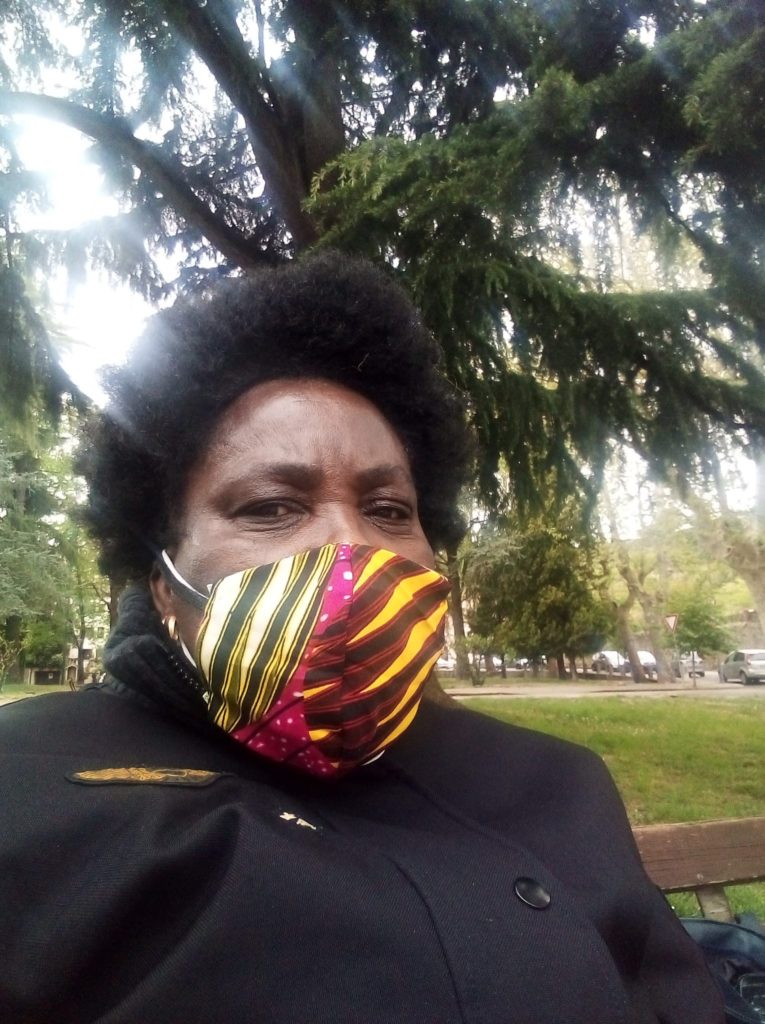
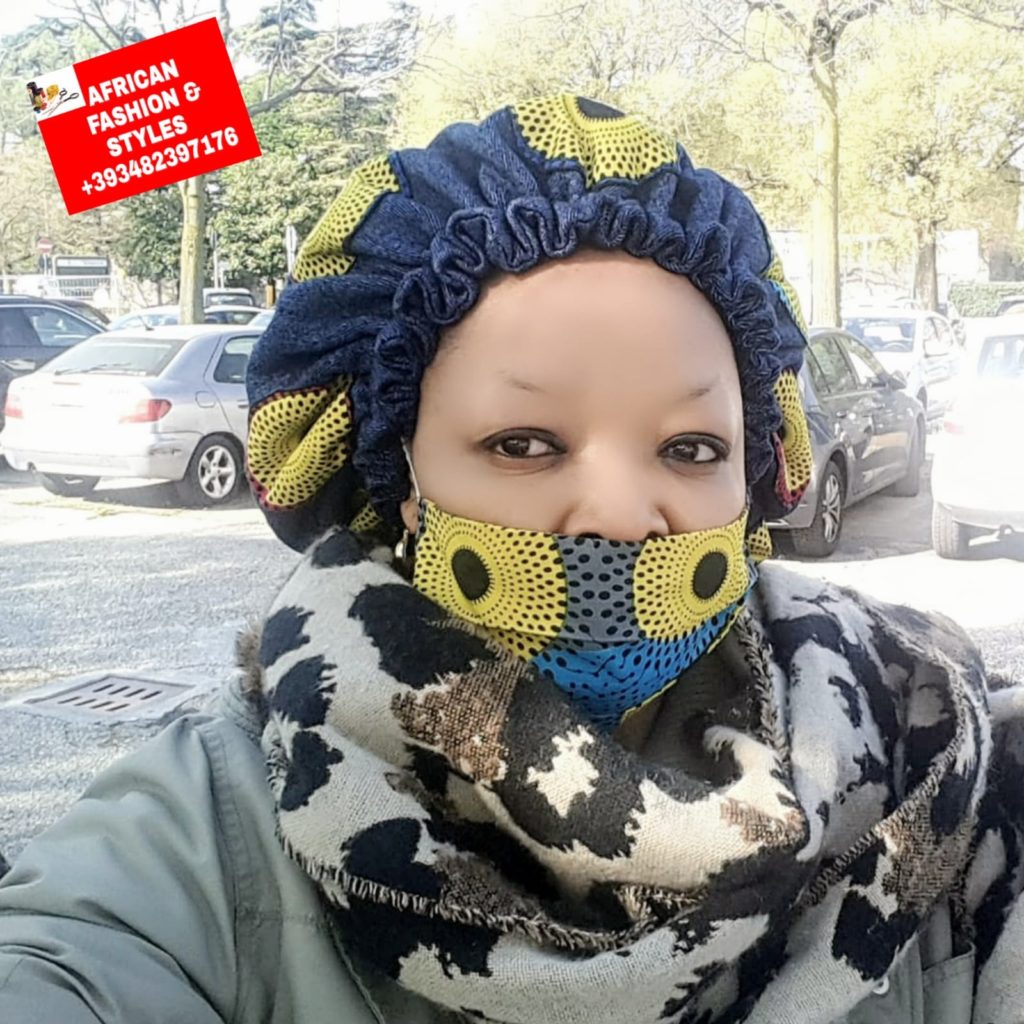
Sandra believes that in this difficult period, communication matter a lot “Calling them, making them know that somebody cares for them is very important. Some of them don’t want to speak with me, but I need to break it. I always say if they want to discuss something to call me.” She also believes that another really important measure is to provide food to them as the majority are facing financial hardship. “Planning to send food to them at home matters a lot too. The majority of them are facing the issue of not having money to pay their house rent. As nobody is out, they are not doing prostitution, how they are going to pay their rent and other bills like gas, electricity? If there is money available to give to them to buy their own food, it will be very nice.”
Besides this work, Sandra also led a women’s group in partnership with Margaret Enabulele, a fashion designer. They are assisting them through sewing and art&crafts workshops. Before the quarantine, they were meeting every week, and now they are meeting online “We are doing art&crafts at home, via WhatsApp, so they don’t feel alone. We teach them how to do their own masks. We are doing many things online”.

